Are Guinea fowl winter and cold hardy birds?
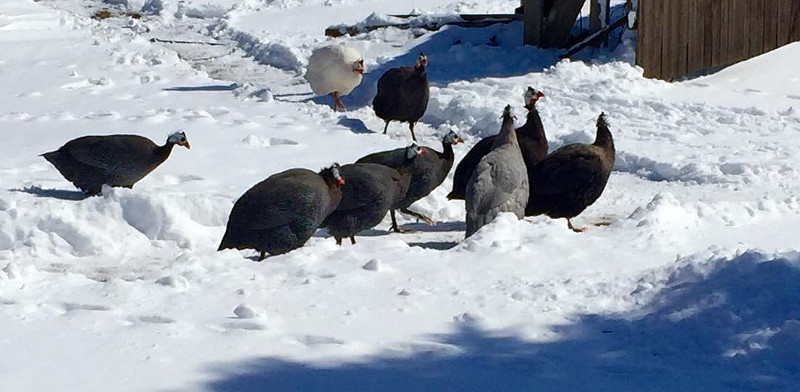
How well do Guineas fowl deal with winter cold, snow and ice?
Although the common helmeted Guinea fowl originate from Africa, they are pretty tough birds that cope well with snow, cold weather and ice and do not require a heated coop. Mine survive and free range all year in North Yorkshire and we get some very bad and cold weather and the Guinea fowl do just fine.
Some poultry keepers prefer to give their birds the option of getting under a heat lamp when temperatures drop below 0 C or 30 F and this is a good idea . If you choose to then make certain that the heat or light source is securely attached well away from flammable stuff and bedding and that both the light bulb and your guineas are protected by a wire shield.
In fact, they seem to cope with the winter cold, rain, frosts and snow better than many chicken varieties. I remember my first winter with Guinea fowl, I was worried about them.
Below: A Guinea fowl shedding the rain off it's feathers.
That winter we had temperatures of -18 C or -1 F for several weeks with a couple of significant snow falls and none of the birds were injured or seemed unduly bothered. The only thing I did differently was clear a path into my large poly-tunnels to let them root around on the ground to keep the active.
Although Guineas are hardy birds they do not have quite the same adaptations to keep their feet warm that chickens and ducks do and if you live in an area where winter temperatures regularly stay below freezing Guinea fowl can get frostbite and lose toes.
Guineas may also be fearful of snow and ice especially if they have never seen it before. Mine in particular hated the foot dropping into the snow sensation when they were walking on it.
Below: Guineas still like to out and about, regardless of the weather.
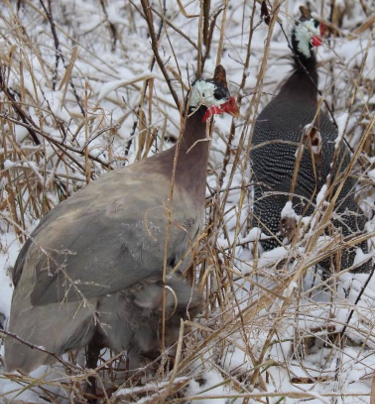
Please do not assume the birds can eat snow in place of drinking water. It takes a lot of snow eating to be equivalent to drinking water and it requires heat energy input to melt it. Even ice cold water actually helps to maintain the body temperature in our Guinea fowl during winter.
A good feed with plenty of protein and calories is very important in winter especially if you live in a part of the world with short days and deep snow as they wont be able to find their own feed. You can help by hiding feed in the coop and run for them to root out during the day to help keep them amused.
Are Guineas cold hardy?
I get asked all the time how my Guineas handle the cold and snow we get every winter.
Below: Guineas can panic in the snow. These are stood on each other in a bit of a flap.
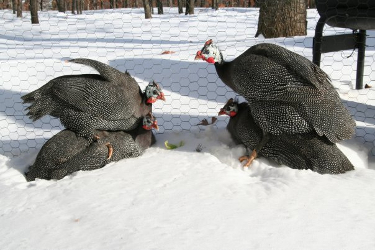
Guineas are quite a bit different then chickens. For one thing, they are nowhere near as clever. That said they do seem to mostly have the sense to stay in shelter when the weather is bad for them.
Windchill is always going to be a problem if your areas are exposed. Otherwise unless you have extreme weather, the chances are your Guineas will be just fine.
Do Guineas need an insulated or heated house or protected run?
Your Guinea housing should provide a place for Guineas to roost in that is dry, draft-free and predator proof but have adequate ventilation, roosting bars, adequate space for the number of birds. In cold weather it should also have ample dry bedding, feed and unfrozen water.
Here is the important point - If they are in a coop and it is dry and sheltered they can survive sustained temperatures of -18 C or -1 F provided they have liquid water and plenty of feed.
Below: Guineas wandering in the snow - in these conditions they probably just need feed and water in a sheltered coop.
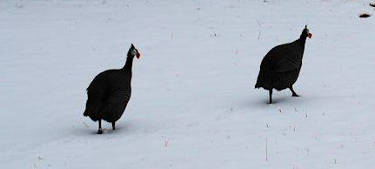
Do Guinea hens need a heat source for winter?
If you have sustained below 0 F temperatures I would have some sort of extra light and heating.
Never turn off a light at night and leave the birds on the floor in the dark, this is a recipe for chaos.
Guineas are shower proof so as long as they do not get soaked through to the bone they fluff up their feathers to insulate themselves and keep warm. They will tuck their heads under a wing and settle down on the perch to cover their feet while sleeping. Just a well sheltered coop and run should be fine.
Do Guineas feet get cold?
Guinea fowl do get cold feet. They will often lift one foot at a time into their feathers to warm it back up.
Guinea fowl are extremely hardy and will cope with the whole range of climates but they don't have the same adaptation in their legs to preserve body heat that chickens and ducks do.
Chickens and ducks have fine networks of blood vessels in the legs that are able to work as heat exchanger. They use warm blood flowing down to the feet to reheat the cold blood from the legs. This enable ducks to swim quite happily in freezing cold water and not lose body heat from the feet.
Below: Not the smartest birds, yes this one probably has cold feet!
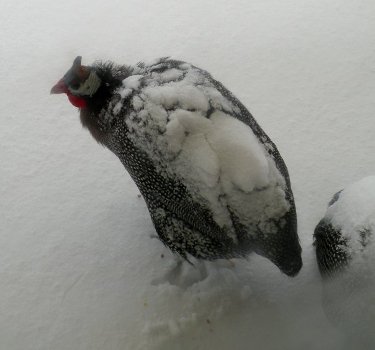
Whilst Guineas can do this, it is not to the same extent so they will get colder feet and feel it more.
Guinea fowl feet are the most likely part to get frostbite. To prevent frostbite in guineas you'll do the same things as you do to prevent frostbite for chickens. Wide roosts and a draft free low moisture coop are the most effective ways to prevent frostbite in all poultry.
Guineas and frostbite:
So do you need to worry about the guinea fowls wattles, after all chickens with large wattles tend to have a problem in winter because they dip into the water when the chicken drinks. The water on the wattles then freezes causing frostbite. Or they just get really cold because the wattles are exposed and the tips freeze.
Guineas wattles are nowhere near as long or flexible. They stay in place so they don't fall forward and dip into the water. Also, that's not a comb on top of the guineas head. Combs are made of fleshy and the Guinea fowl horn is actually bone, so there is nothing to become frostbitten.
Below: Guineas are fine in the snow.
Treatment is the same, Vaseline applied the wattles before going out. Good luck with that though, applying Vaseline to a guinea fowls wattles will be an experience you will never forget.
Can you let Guinea fowl out in the snow?
Yes, guinea fowl do like to get out for some exercise and fresh air even in the winter. On a snowy but calm day when there are no hazardous conditions then let them out.
Below: In relatively mild conditions these birds are fine to be out as normal.
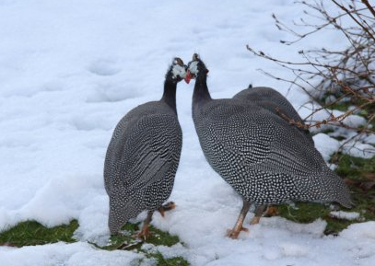
The least they will do is honk at the snow and scuttle about. The one thing I have noticed that they do not like is when the snow collapses under the weight of their feet, it can freak them out a bit.
